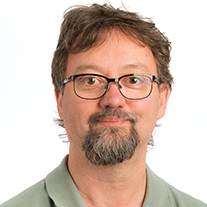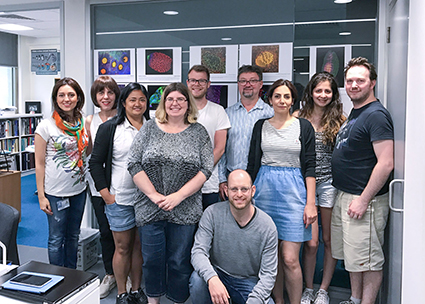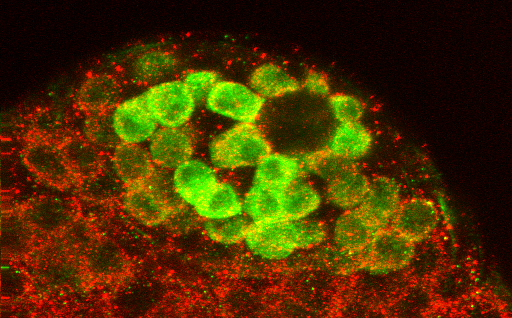Hime laboratory: Stem cell genetics and Drosophila models of human disease
-
Head of Laboratory

Professor Gary Hime+61 3 8344 5796
Research Overview
View Professor Hime's latest publications listing here.

Many differentiated but renewable cell types in vertebrates are derived from relatively small populations of dedicated precursors, or stem cells. The ability to replenish differentiated cells depends on the continued survival and proliferation of their respective stem cell populations. Stem cells are not only important for regeneration of healthy tissues but also play a key role in pathogenesis.
If we are to realise the goals of re-programming tissue differentiation, growing organs for transplantation in vitro, regeneration of damaged organs in vivo and targeted effective treatments for cancer it is essential that we understand the molecules and mechanisms that stem cells utilise for renewal and differentiation. The identification of mechanisms that regulate asymmetric division, daughter cell mitotic amplification and stem cell differentiation have been difficult to ascertain. These types of studies benefit greatly from the analysis of simple, genetically tractable systems.
For these reasons we have chosen to focus on two stem cell niches (male germ line and intestinal) in Drosophila and mouse as models for stem cell systems.
Our lab is focussed on analysing genes that regulate stem cell maintenance and differentiation using genetic screening in Drosophila and conditional mouse knockout models. The outcomes of our genetic studies are being used to identify genes that regulate initiation and growth of colorectal and testicular cancers in addition to determining how we can regulate organ regeneration. Drosophila is also a fast and efficient in vivo system to functionally test human gene variants. We are testing the phenotypic consequences mutations that are linked to human genetic diseases.

Staff
Professor Gary Hime, Head of Laboratory
Nicole Siddall, Postdoctoral Researcher
Franca Casagranda, Research Assistant
Andrew Boyd, PhD student
Caitlin van Ree, Honours student
James Heaney, PhD student
Farnaz Shapouri, PhD student
Shaghyegh Saeidi, PhD student
Aviv Gafni, PhD student
Rowena Sannang, Masters (MPhil) student
Elena Savva, Masters (MSc) student
John Qi, Masters (MSc) student
Collaborators
Associate Professor Helen Abud, Monash University Biomedicine Discovery Institute
Professor Kate Loveland, Hudson Institute of Medical Research
Professor D Leanne Jones, University of California at Los Angeles, USA
Professor Margaret Fuller, Stanford University, USA
Professor Eileen McLaughlin, University of Auckland
Professor Julie Brill, The Hospital for Sick Kids, Toronto, Canada
Funding
2017-2019 ARC Discovery Project. Differential roles of gene family members in development of a cell lineage
2016-2018 NHMRC Project Grant. Role of Snail proteins in mediating intestinal stem cell identity
Research Opportunities
This research project is available to PhD students, Masters by Research, Honours students, Master of Biomedical Science, Post Doctor Researchers to join as part of their thesis.
Please contact the Research Group Leader to discuss your options.
Research Publications
Siddall NA, Hime GR. A Drosophila toolkit for defining gene function in spermatogenesis. Reproduction 2017; 153: R121-132.
Dominado N, La Marca JE, Siddall NA, Heaney J, Tran M, Cai Y, Yu F, Wang H, Somers WG, Quinn LM*, Hime GR*. Rbf regulates Drosophila spermatogenesis via control of somatic stem and progenitor cell fate in the larval testis. Stem Cell Reports 2016; 6: 1152-1163.
* joint senior authors
Horvay K, Jarde T, Casagranda F, Perreau VM, Haigh K, Nefzger CM, Akhtar R, Gridley T, Berx G, Haigh JJ, Barker N, Polo JM, Hime GR*, Abud HE*. Snai1 regulates cell lineage allocation and stem cell maintenance in the mouse intestinal epithelium. EMBO Journal 2015; 34(10): 1319-35.
*joint senior authors,
Voog J, Sandall SL, Hime GR, Resende LP, Loza-Coll M, Aslanian A, Yates JR 3rd, Hunter T, Fuller MT, Jones DL. Escargot restricts niche cell to stem cell conversion in the Drosophila testis. Cell Reports 2014; 7(3): 722-34.
Horvay K, Casagranda F, Gany A, Hime GR, Abud HE () Wnt Signaling Regulates Snai1 Expression and Cellular Localization in the Mouse Intestinal Epithelial Stem Cell Niche. Stem Cells Dev 2011; 20(4): 737-745.
Monk AC, Siddall N, Volk T, Fraser BA, Quinn LM, McLaughlin EA, Hime GR. The RNA-binding protein HOW is required for stem cell maintenance in the testis and for the onset of transit amplifying divisions. Cell Stem Cell 2010; 6(4): 348-60.
Siddall NA, McLaughlin EA, Marriner NL, Hime GR () The RNA-binding protein Musashi is required intrinsically to maintain stem cell identity. Proc Natl Acad Sci U.S.A 2006; 103: 8402-8407.
Research Projects
- EMT regulators in intestinal and germline stem cells
- Transcriptional regulation of intestinal organoid differentiation
- Novel regulators of germline stem cells
- Analysing genetic roles of RNA-binding proteins and alternative splicing in Drosophila stem cells
- Cellular trafficking and male fertility
Faculty Research Themes
School Research Themes
Cancer in Biomedicine, Stem Cells, Molecular Mechanisms of Disease
Key Contact
For further information about this research, please contact Head of Laboratory Professor Gary Hime
Department / Centre
Unit / Centre
Hime laboratory: Stem cell genetics and Drosophila models of human disease
MDHS Research library
Explore by researcher, school, project or topic.